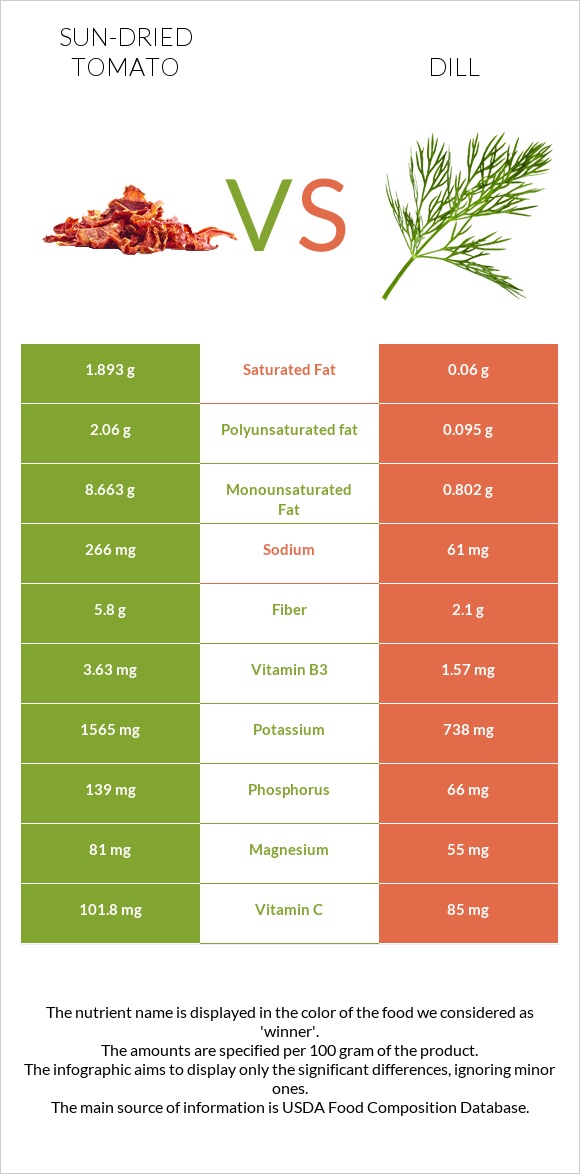Sun-dried tomato vs. Dill — In-Depth Nutrition Comparison
Compare
Differences between sun-dried tomato and dill
- Sun-dried tomato has more copper, potassium, vitamin C, fiber, and vitamin B3, while dill has more vitamin A, iron, manganese, folate, and calcium.
- Dill's daily need coverage for vitamin A is 129% higher.
- Dill contains 3 times less copper than sun-dried tomato. Sun-dried tomato contains 0.473mg of copper, while dill contains 0.146mg.
- Dill has a lower glycemic index. The glycemic index of dill is 15, while the glycemic index of sun-dried tomato is 30.
The food types used in this comparison are Tomatoes, sun-dried, packed in oil, drained and Dill weed, fresh.
Infographic

Infographic link
Mineral Comparison
Mineral comparison score is based on the number of minerals by which one or the other food is richer. The "coverage" charts below show how much of the daily needs can be covered by 300 grams of the food.
| Contains more MagnesiumMagnesium | +47.3% |
| Contains more PotassiumPotassium | +112.1% |
| Contains more CopperCopper | +224% |
| Contains more PhosphorusPhosphorus | +110.6% |
| Contains more SeleniumSelenium | +∞% |
| Contains more CalciumCalcium | +342.6% |
| Contains more IronIron | +145.9% |
| Contains more ZincZinc | +16.7% |
| Contains less SodiumSodium | -77.1% |
| Contains more ManganeseManganese | +171.2% |
Vitamin Comparison
Vitamin comparison score is based on the number of vitamins by which one or the other food is richer. The "coverage" charts below show how much of the daily needs can be covered by 300 grams of the food.
| Contains more Vitamin CVitamin C | +19.8% |
| Contains more Vitamin B1Vitamin B1 | +232.8% |
| Contains more Vitamin B2Vitamin B2 | +29.4% |
| Contains more Vitamin B3Vitamin B3 | +131.2% |
| Contains more Vitamin B5Vitamin B5 | +20.7% |
| Contains more Vitamin B6Vitamin B6 | +72.4% |
| Contains more Vitamin AVitamin A | +503.1% |
| Contains more FolateFolate | +552.2% |
All nutrients comparison - raw data values
| Nutrient |  |
 |
DV% diff. |
| Iron | 2.68mg | 6.59mg | 49% |
| Copper | 0.473mg | 0.146mg | 36% |
| Vitamin A | 64µg | 386µg | 36% |
| Manganese | 0.466mg | 1.264mg | 35% |
| Folate | 23µg | 150µg | 32% |
| Potassium | 1565mg | 738mg | 24% |
| Fats | 14.08g | 1.12g | 20% |
| Monounsaturated fat | 8.663g | 0.802g | 20% |
| Vitamin C | 101.8mg | 85mg | 19% |
| Calcium | 47mg | 208mg | 16% |
| Fiber | 5.8g | 2.1g | 15% |
| Vitamin B3 | 3.63mg | 1.57mg | 13% |
| Polyunsaturated fat | 2.06g | 0.095g | 13% |
| Vitamin B1 | 0.193mg | 0.058mg | 11% |
| Phosphorus | 139mg | 66mg | 10% |
| Vitamin B6 | 0.319mg | 0.185mg | 10% |
| Calories | 213kcal | 43kcal | 9% |
| Sodium | 266mg | 61mg | 9% |
| Saturated fat | 1.893g | 0.06g | 8% |
| Vitamin B2 | 0.383mg | 0.296mg | 7% |
| Magnesium | 81mg | 55mg | 6% |
| Carbs | 23.33g | 7.02g | 5% |
| Selenium | 3µg | 5% | |
| Protein | 5.06g | 3.46g | 3% |
| Vitamin B5 | 0.479mg | 0.397mg | 2% |
| Zinc | 0.78mg | 0.91mg | 1% |
| Net carbs | 17.53g | 4.92g | N/A |
| Tryptophan | 0.037mg | 0.014mg | 0% |
| Threonine | 0.128mg | 0.068mg | 0% |
| Isoleucine | 0.121mg | 0.195mg | 0% |
| Leucine | 0.185mg | 0.159mg | 0% |
| Lysine | 0.186mg | 0.246mg | 0% |
| Methionine | 0.044mg | 0.011mg | 0% |
| Phenylalanine | 0.131mg | 0.065mg | 0% |
| Valine | 0.13mg | 0.154mg | 0% |
| Histidine | 0.077mg | 0.071mg | 0% |
Macronutrient Comparison
Macronutrient breakdown side-by-side comparison
Protein:
5.06 g
Fats:
14.08 g
Carbs:
23.33 g
Water:
53.83 g
Other:
3.7 g
Protein:
3.46 g
Fats:
1.12 g
Carbs:
7.02 g
Water:
85.95 g
Other:
2.45 g
| Contains more ProteinProtein | +46.2% |
| Contains more FatsFats | +1157.1% |
| Contains more CarbsCarbs | +232.3% |
| Contains more OtherOther | +51% |
| Contains more WaterWater | +59.7% |
Fat Type Comparison
Fat type breakdown side-by-side comparison
Saturated fat:
Sat. Fat
1.893 g
Monounsaturated fat:
Mono. Fat
8.663 g
Polyunsaturated fat:
Poly. Fat
2.06 g
Saturated fat:
Sat. Fat
0.06 g
Monounsaturated fat:
Mono. Fat
0.802 g
Polyunsaturated fat:
Poly. Fat
0.095 g
| Contains more Mono. FatMonounsaturated fat | +980.2% |
| Contains more Poly. FatPolyunsaturated fat | +2068.4% |
| Contains less Sat. FatSaturated fat | -96.8% |





